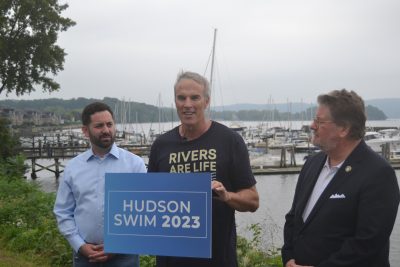Endurance Swimmer Stops in Croton Highlighting Pollution-Free Waterways
News Based on facts, either observed and verified directly by the reporter, or reported and verified from knowledgeable sources.

British endurance swimmer Lewis Pugh took a break from his historic 315-mile swim down the Hudson River, stopping at a Croton marina Saturday morning to speak about his swim.
The purpose of his journey, which started Aug. 13 at the river’s source in Lake Tear of the Clouds in the Adirondacks, is to emphasize the importance of keeping waterways clean and safe.
“This swim is about the Hudson River but I hope it sends a message around the world that your river can also be saved, whether you’re in China, India, South America or South Africa,” Pugh said. “I pray that people can look at the Hudson and say ‘Look what the Americans did; we can also do the same.’”
Pugh, 53, was appointed United Nations Patron of the Oceans in 2013 and is the first person to complete a long-distance swim in every ocean. An activist and former maritime lawyer, Pugh has for the last 36 years swam across the North Pole, the Red Sea, the 325-mile English Channel, a glacial lake on Mount Everest and the waters of Antarctica.
Generally, Pugh swims two hours in the morning and three hours in the evening. He wears only his Speedo, cap and goggles, and without gloves or fins he is considered to be the first person to swim the Hudson River “unassisted.” (In 2004, Christopher Swain swam the length of the Hudson wearing a wetsuit.)
Following Pugh on the river is a support staff in a small boat that includes a cook, a physiotherapist and a “safety kayaker” who paddles alongside.
For decades, the Hudson was considered too polluted to swim. Unregulated dumping of raw sewage, chemicals, plastic waste, and radioactive tritium released by Indian Point nuclear power plant in Buchanan rendered the river and its fish highly toxic. The worst case of discarded industrial waste was 1.3 million pounds of polychlorinated biphenyls (PCBs) dumped by GE plants into the Hudson at Fort Edward and Hudson Falls.
Pugh chose to swim the Hudson at night before stopping in Croton-on-Hudson because the river currents were more favorable. He shared his thoughts as he swam past Indian Point, a location that has held special meaning for Pugh and others. Last month, Gov. Kathy Hochul signed the Save the Hudson bill, which restricts the decommissioned Indian Point from releasing radioactive water into the river.
“Last night as I was swimming past Indian Point, I was thinking that this swim may very well end at Indian Point if Gov. Hochul didn’t sign the legislation,” Pugh explained. “But thankfully she made a good decision for the river, the wildlife and for our children.”
Purging the Hudson of dangerous pollutants became the mission of environmental groups including Riverkeeper, Pete Seeger’s Clearwater, Scenic Hudson and the Indian Point Safe Energy Coalition. When the federal Clean Water Act of 1972 was enacted, it forced sewage treatment plants, factories and towns to stop discharging effluent and pollutants into waterways, seeking to eventually create water safe enough for fishing and swimming.
Thanking Pugh for highlighting the fight to keep the Hudson clean were Rep. Mike Lawler (R-Pearl River) and state Sen. Peter Harckham (D-Lewisboro).
Harckham, who co-sponsored the Save the Hudson bill, praised Pugh for bringing attention to keeping the Hudson clean.
“This is really a banner day,” Harckham said. “You are putting an exclamation point on the work we have done. We have spent decades and billions of dollars cleaning up this river from contaminants because the river is the lifeblood of our economy. Many municipalities along the river have invested millions of dollars to revitalize the riverfront.”
Lawler told Pugh of ongoing efforts to protect the Hudson River by the federal and state governments.
“It’s great to be in this position on a federal level and to be working with Sen. Harckham to raise awareness to protect the watershed here in the Hudson Valley,” Lawler said.
Harckham stressed the importance of protecting the Hudson.
“People are saying that no level of pollution is an acceptable amount of pollution and that our water bodies are critical to our economic sustainability,” he said. “Your being here and swimming the Hudson River brings that into focus.”
Pugh intends on ending his long swim at New York City’s Battery Park on Wednesday, in time to speak at the 78th session of the United Nations General Assembly during Climate Week NYC. He will also celebrate the signing earlier this year of the High Seas Treaty at the U.N., an historic agreement, which pledges to protect 30 percent of the Earth’s land and water by 2030.
“I am so looking forward to getting to New York (City) and finally seeing that Statue of Liberty, which has welcomed people to America for generations,” Pugh said. “Whenever I see the Statue of Liberty, I think that everything that we hold dear relies on us being able to drink clean water, breathe fresh air and take care of our planet so that it is inhabitable for our children and our grandchildren.”

Abby is a local journalist who has reported on breaking news for more than 20 years. She currently covers community issues in The Examiner as a full-time reporter and has written for the paper since its inception in 2007. Read more from Abby’s editor-author bio here. Read Abbys’s archived work here: https://www.theexaminernews.com/author/ab-lub2019/
